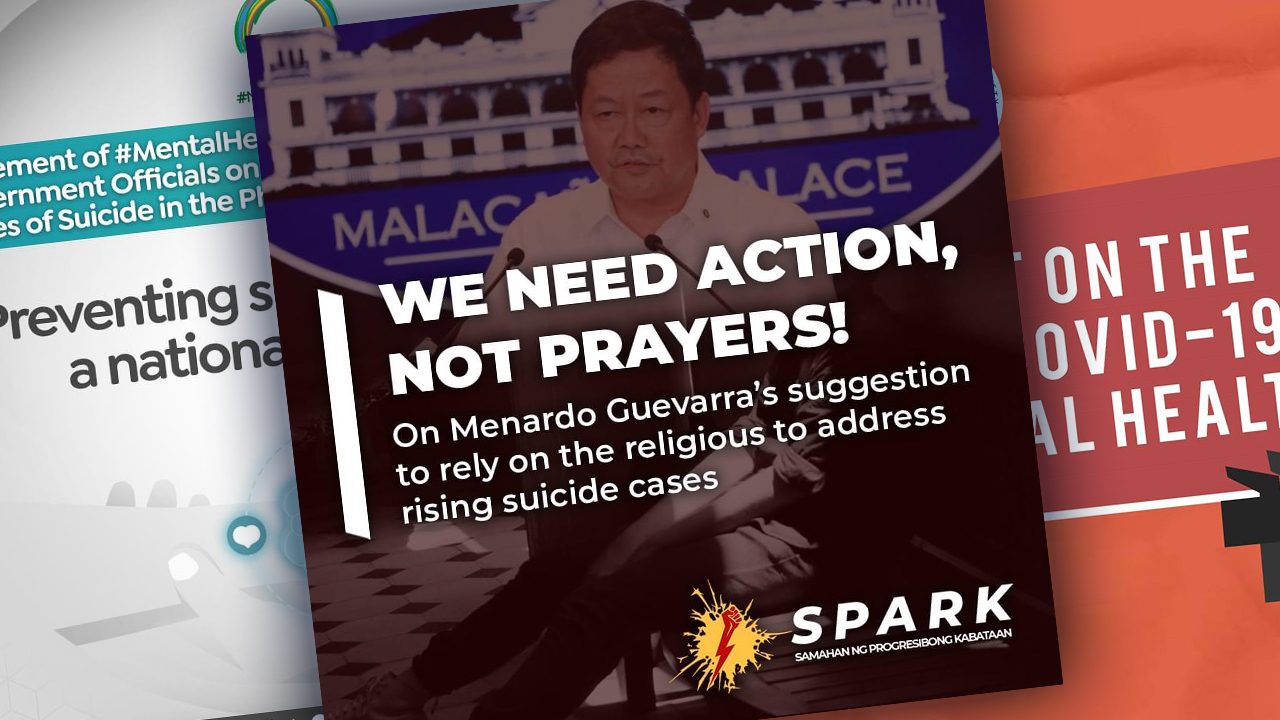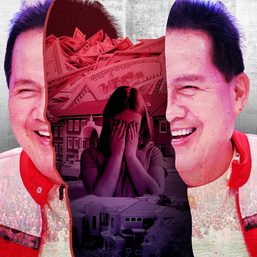SUMMARY
This is AI generated summarization, which may have errors. For context, always refer to the full article.

Mental health groups and advocates criticized Justice Secretary Menardo Guevarra, a member of the Inter-Agency Task Force (IATF) on the Management of Emerging Infectious Diseases, over his “downright insulting” suggestion to call on churches and spiritual leaders for help amid the rising number of suicide cases during the coronavirus pandemic.
Groups including MentalHealthPH, Samahan ng Progresibong Kabataan (SPARK), and University of the Philippines Manila (UPM) Peer Empowering Peers Society emphasized that it should be mental health professionals rather than religious leaders who should be at the helm of addressing the “psychological toll of COVID-19.”
“The calling for religious leaders to mainly address this issue is downright insulting to mental health professionals in the country, especially when these very religious institutions have created a long-held malicious narrative about mental health,” SPARK said.
According to the group, religious institutions have contributed to the stigma against mental illness, as many followers believe that those who commit suicide are sent to hell.
SPARK, however, emphasized that the rise of suicides is not a “spiritual failure” but rather a “result of the failure of the state to give their people hope.”
“In order for the deaths to stop, we do not need religion, we need action. We need free mass testing, social programs, unemployment insurance, increased subsidies for the poor; we need accessible programs to help those with mental illness. We need hope,” SPARK said.
Guevarra earlier echoed Inter-Agency Task Force chief implementer Carlito Galvez Jr in expressing concern over Filipinos who are “undergoing depression due to loss of employment or livelihood, anxiety of being afflicted with or dying from the dreaded disease, loneliness arising from isolation, and lack of hope for a return to their normal lives.”
Still, Guevarra, along with Galvez, called on spiritual leaders to spread a “message of hope” to Filipinos in order to “stave off more incidents of self-destruction.”
Not to be underestimated
Although religious coping mechanisms may provide support to people’s mental health, UPM Peer Empowering Peers Society highlighted how the role of professional mental health services should not be underestimated in lowering the number of suicide cases in the country.
“Proper referral to mental health professionals is of utmost importance because they have been trained and licensed to appropriately diagnose and treat mental health problems,” UP Peer Empowering Peers Society said.
Since the lockdown began in March, experts have been bracing for a nationwide mental health epidemic due to a predicted increase in cases of anxiety and depression brought about by unprecedented periods of quarantine, isolation, and uncertainty.
High time to work together
This has pushed MentalHealthPH to assert the need to make suicide prevention a “national imperative,” adding how it is “high time” for government agencies, non-governmental organizations, and private sectors to work together in addressing the mental health needs of Filipinos.
The Philippines currently has a landmark mental health law, which secures the rights and welfare of persons with mental health needs, as well as provide mental health services and promote mental health education to schools, barangays, and workplaces.
However, there are only 600 psychiatrists in the Philippines for a population of over 100 million, which could leave thousands with no means to seek treatment or help, according to Dr Angelo Jesus Arias, a psychiatrist based in Dumaguete City and a director of the Philippine Psychiatric Association.
Though religious leaders play a vital role in nation-building, MentalHealthPH reminded the public not to forget about frontliners as “key stakeholders” in the fight against COVID-19.
“Let us also not forget our important frontliners – psychiatrists, psychologists, psychometricians, guidance counselors and other mental health professionals and other allied health care workers – who are at their best in innovating approaches to tackle the psychological toll of COVID-19 such as suicide,” MentalHealthPH said. – Rappler.com
Add a comment
How does this make you feel?
![[Judgment Call] Is Rappler an ‘enabler’ of Catholic ‘copycats’?](https://www.rappler.com/tachyon/2024/04/catholics-copycats-april-18-2024.jpg?resize=257%2C257&crop=418px%2C0px%2C1080px%2C1080px)


![[Rappler’s Best] The elusive big fish – and big fishers](https://www.rappler.com/tachyon/2024/04/The-elusive-big-fish-%E2%80%93-and-big-fishers.jpg?resize=257%2C257&crop=220px%2C0px%2C720px%2C720px)
There are no comments yet. Add your comment to start the conversation.